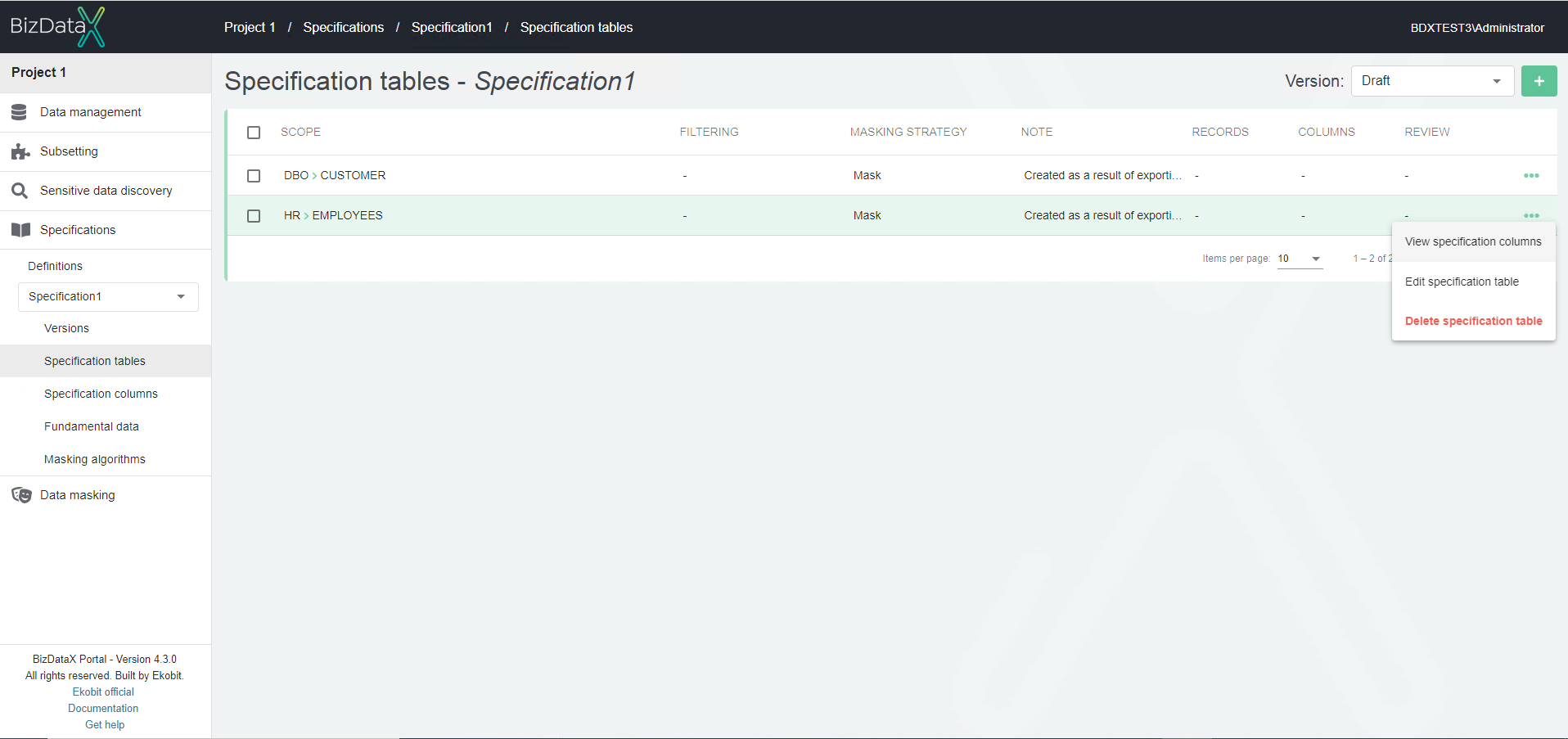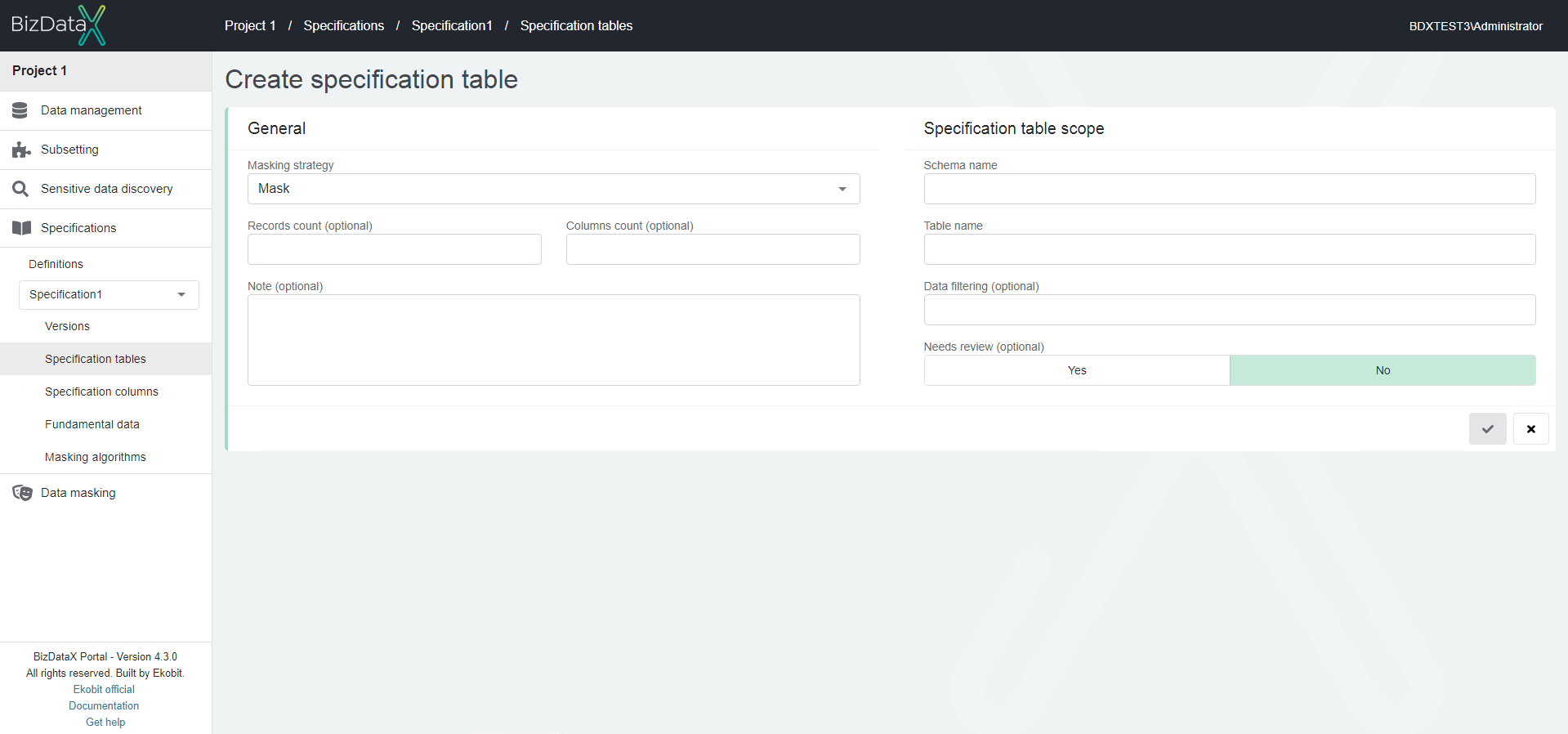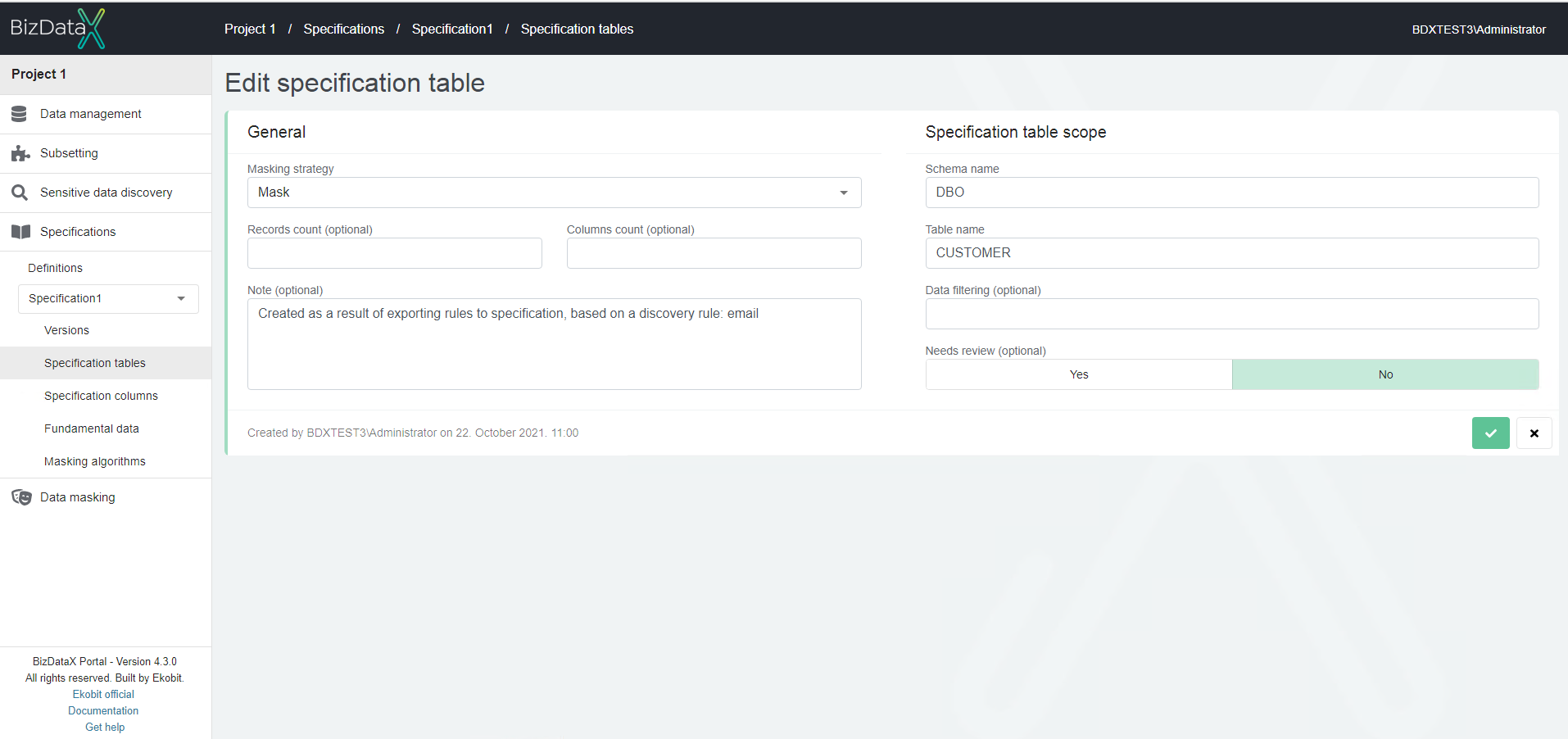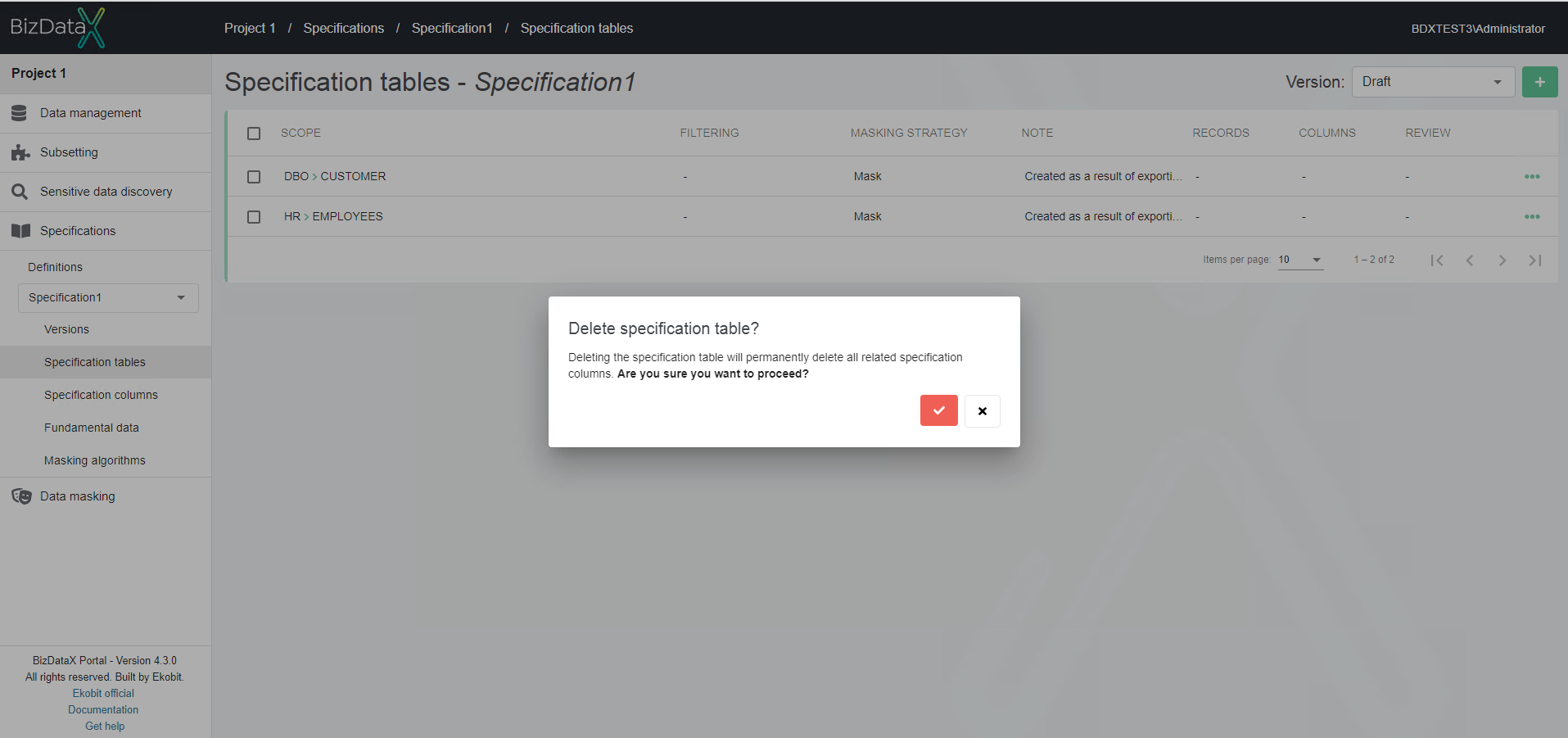- BizDataX
- Installation guide
- Requirements
- BizDataX Designer installation
- BizDataX Designer version upgrade
- BizDataX Designer advanced settings
- BizDataX Portal installation
- BizDataX Portal version upgrade
- BizDataX Portal advanced settings
- NuGet packages installation
- Start guide
- Creating a data model (BizDataX Portal)
- Finding sensitive data
- Producing a specification
- Creating a new Visual Studio BizDataX project
- Creating a data model (BizDataX Designer)
- Creating a simple masking flow
- Publishing package to BizDataX Portal
- Executing package
- BizDataX Portal
- User manual
- BizDataX Designer
- Workflow
- Creating a new Visual Studio BizDataX project
- User interface elements
- Creating a data model
- Toolbox items
- Masking activities
- BizDataX Masking Control Flow
- BizDataX Country CH
- Generate AHV (Sozialversicherungsnummer)
- Generate CH IBAN
- Pick CH address from list
- Pick CH bank from list
- Pick CH company from list
- Pick CH first name from list
- Pick CH last name from list
- Pick CH place from list
- Pick CH street from list
- BizDataX Country DE
- Generate DE IBAN
- Pick DE address from list
- Pick DE bank from list
- Pick DE company from list
- Pick DE first name from list
- Pick DE last name from list
- Pick DE place from list
- Pick DE street from list
- BizDataX Country HR
- Generate HR bank account
- Generate HR BBAN
- Generate HR IBAN
- Generate JMBG
- Generate maticni broj
- Generate OIB
- Generate porezni broj
- Pick HR address from list
- Pick HR bank from list
- Pick HR company from list
- Pick HR first name from list
- Pick HR last name from list
- Pick HR place from list
- Pick HR street from list
- BizDataX Country US
- Generate US SSN
- Pick US address from list
- Pick US company from list
- Pick US first name from list
- Pick US last name from list
- Pick US place from list
- Pick US street from list
- BizDataX Data Processing
- BizDataX Database
- BizDataX Generators
- Generate and convert
- Generate and convert to number
- Generate and convert to text
- Generate business name
- Generate credit card number
- Generate date
- Generate date in range
- Generate Email
- Generate fixed digit number
- Generate IBAN
- Generate items
- Generate items in random order
- Generate number in range
- Generate number sequence
- Generate numbered string
- Generate PAN
- Generate phone number
- Generate text
- Generate value
- BizDataX Monitoring
- BizDataX Pick Data From List
- Pick address from list
- Pick bank from list
- Pick company from list
- Pick first name from list
- Pick last name from list
- Pick place from list
- Pick street from list
- Pick value from list
- BizDataX Primitives
- API masking
- Assign date
- Assign number
- Assign text
- Assign value
- Clear value
- Evaluate date function
- Evaluate function
- Evaluate numeric function
- Evaluate text function
- Format properties
- BizDataX Repeating
- Assign repeating value
- Clear repeater
- Load repeaters
- Load single repeater
- Repeating of any value condition branch
- Repeating of boolean condition branch
- Repeating of date condition branch
- Repeating of number condition branch
- Repeating of text condition branch
- Save repeaters
- Save single repeater
- Set any repeating value
- Set boolean repeating value
- Set date repeating value
- Set number repeating value
- Set text repeating value
- Fluent Handler API
- Package steps
- Package parameters
- Publishing package to BizDataX Portal
- Package execution
- Masking-examples
- Logging
- Functions
- Custom code
- Picklists
- Addresses
- Banks
- Business suffixes
- Companies
- Domain names
- First names
- Last names
- Phone codes
- Places
- Streets
- Data generators
- Lambda expressions
- Synthetic data generation
- Repeaters
- Restartability
- Masking conditioned by data from related entities
- File masking
- Advanced
- Supported data sets
- Oracle
- Oracle database analyzer
- Oracle database handler
- Repeaters persistence
- Restartability store configuration
- Oracle database subsetting
- Microsoft SQL Server
- SQL Server database analyzer
- SQL Server database handler
- Repeaters persistence
- Restartability store configuration
- DB2
- Informix
- Sybase
- PostgreSQL
- Release notes
Specification tables
Specification table defines scope (schema and table) and masking strategy in the masking process.
| Contents |
|---|
| Specification Tables Overview list |
| Create specification table |
| Edit specification table |
| Delete specification table |
Specification tables overview list
All created Specification Tables can be viewed on this Specification Tables Overview List screen.
Only basic information is shown so you can identify Specification Tables at a glance. It contains a table detailing every created Specification Table, showing: Scope, Filtering, Masking strategy, Note, Records, Columns and Review.
Overview will be by default ordered by Scope. There is a possibility to change the order of all columns descending or ascending. When list of created Specification Tables is displayed user can select one Specification table row to do next actions:
If there are no specification tables, the specification table overview list is empty.

Main parameters for each of the table:
- Scope - Scope is defined by: Schema_name – Table_name
- Filtering - automatically filled with part of data from the table where joined Masking strategy applies.
- Masking strategy - automatically filled with one masking strategy for the table
- Note - Note related to entered specification table
- Records - automatically filled when creating or editing specification table with number of records in the table
- Columns - automatically filled when creating or editing specification table with number of columns in the table
- Review - automatically filled 'Yes' or 'No' for marking the table for the later discussion
Create specification table
To create a specification table, click on the Create specification table button in the top right corner.
Create specification table screen will be open and the following information can be entered:
General
Masking strategy - Drop-down list with options which define part of data from the table where joined Masking strategy applies.
- Mask (mask data in the table),
- Truncate (truncate data from the table),
- Intact (leave data intact).
It will be used when some data from the table should be masked and some should be truncated or left intact. If multiple strategies have to be applied to a single table, that table must be created here so many times.
Records count - number of records in the table (optional)
Columns count - number of columns in the table (optional)
Note - Note related to entered specification table (optional)
Specification table scope
- Schema name - Schema name
- Table name - Table name
- Data filtering - define part of data from the table where joined Masking strategy applies.
- Needs review - allows marking the table for the later discussion (optional)

Edit specification table
The edit specification table page allows the user to change specification properties. All fields are amendable.

Delete specification table
If specification table is no needed user can select on specification table overview list one or more specification table rows, by using checkboxes, to Delete specification tables.
A confirmation message appears before deleting. After confirmation, specification table folder will be deleted and it will no longer show on specification tables overview list.

If Specification table gets deleted, it also deletes linked Specification Columns.
BizDataX Documentation © Built by Ekobit. All rights reserved.
https://www.ekobit.com/ https://bizdatax.com/ https://bizdatax.com/support/